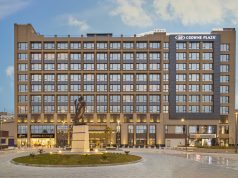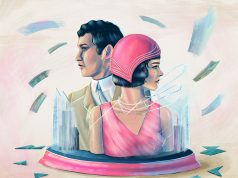A powerhouse talent, Mohamed Attia is a name that rolls out in the credits of many an iconic film. As a production designer, he plays a huge role in creating an authentic, convincing ambiance to bring each scene to life.
Attia, as most know him, opened up in a candid chat and gave us insight into his work, and life.
By Hannah Sheta
You have accomplished an astonishing level of work in diverse areas of your field since you started out. What can you tell us about this journey?
The fact that I started as an architect and studied architecture gives me a background that enables me to approach production design in a way that is different. Training with big directors like Youssef Chahine and working with leading directors like Mohamed Khan, Yoursy Nasrallah, Marwan Hamed, Tarek El Erian, Ahmed Alaa and Mohamed Yassin early in my life helped me evolve. Mohamed Attia
I am picky in the movies and topics that I choose because I believe cinema is a production designer’s history. I have also worked on important events like El Gouna Film Festival, the Cairo International Film Festival, the opening of the New Administrative Capital, youth forums in Sharm El Sheikh, and finally the Pharaohs’ Golden Parade, which is something I’m very proud of.
I believe we spend our whole lives learning, and that is what I always tell everyone who works with me. Everything we do, every job we get, we always gain some kind of experience whether it be artistic, technical, administrative or even just how to get along with different people.
What is your work like?
My work as a product designer requires teamwork on many different levels. For instance, a team comprised of the director, director of cinematography and producer; and another comprised of assistants, the props crew and the workers. Cooperation with colleagues is always at the beginning of the process, at the inception of the idea. Mohamed Attia
When I receive the script from the writer and director, I begin to mull it over, and after reading it in detail, I study and imagine every aspect of it. I sit with the director to unify our vision because if our ideas don’t fit together, it won’t work.
So the most important thing is the coordination of what we each imagine; myself, the director and then the cinematographer. After that, we check with production to see what options are viable on a technical and a financial level. Our options are to either build or explore existing locations. Sometimes we may go over the budget allocated by the producer, although after a certain amount of experience, we are usually able to gauge the estimated cost.
My assistants help me with making 3D models for my sketches that we go back and forth with to the directing team, cinematographers and production team. Until we reach an agreement and we begin filming. Mohamed Attia
What have been the high points to date?
I love everything I have ever worked on. I consider them all peaks in my career, even though some had more of an impact than others, like the Pharaohs’ Golden Parade, as it was a national project on a much bigger scale.
Afarah El Obba was an important point in my career, as were both of the Feel El Azra2 movies and Welad Rizk, a very commercial kind of movie that had a lot of effort put into it. Mohamed Khan’s movies are where I started to get into production design, so they are very significant to me. Mohamed Attia
Which have been the most challenging projects and how did you manage them?
The Pharaohs’ Golden Parade was very complicated and it was the first time I had ever worked on anything like it. It was a really big deal, we knew the whole world would be watching, so it was challenging. We were moving and filming 22 kings and queens, each of them priceless, so it was scary and the work conditions were hard.
Any mistakes we made would have been a huge deal, unlike in films where we could cut and redo. Not only was it live, but it was also an important and sensitive task. Great management was more important than creativity in order to avoid making any mistakes.
What are your thoughts on recent strides in Egypt’s film industry?
It’s quite complicated. I personally feel like the role of film theaters will decrease and there will be more substitutes and platforms that will replace the role of cinema in entertainment. So making movies will look different. Even though this will create work opportunities for more people, I believe that cinema itself has a certain structure and I fear it will change.
Sometimes the lack of order in production creates a different kind of creativity. If it begins to look like mass production and there is a prototype where we cannot make changes in words or scenarios or locations when we start filming, this extreme sanctity in the rules of the platform could hinder the spontaneity, because no ideas are born complete.
We are starting to see youth come up with new ideas and movies written and created completely out of the box, so they are qualified to participate in film festivals and they win awards which shows the presence of Egypt and it’s a very positive step.
What do you have in the pipeline at the moment?
I am currently working on The Eight series for MBC and another with Mohamed Yassine for Ramadan, and in the coming two months I am supposed to work on a very important event in Luxor.
What would be a dream project for you?
A movie or production that would compete with the more developed world in terms of cinema like America or Europe. With endless possibilities that are not just money, but systems that we can manage with.
I really want to do a historical movie but without management. With the right set designer, producer and everyone in between, this would be ideal and only then can we really compete. I want the sky to be our limit.
Quickfire round:
If you had a one-month vacation how would you use it?
An island in an ocean away from the noise. I just want to free my mind and go into a different world, away from work pressures where I can restart my brain and focus on my family because work gets in the way of that.
Comfort food?
Seafood. I’m crazy about fish. And Italian food. I know it’s not healthy but I love pizza and pasta and everything Italian. Mohamed Attia
Music that relaxes you?
World music. A variety of music from around the world and different cultures. I collect music from Latin America, Europe, Russia, Pakistan, Egypt, Morocco, Africa and Asia. I love cultural music.
Last book you read?
Katiba Sawdaa by Mohamed Al Mansy Kandil
Best film watched in the past year?
A Hidden Life by Terrence Malick is the last film I saw and really liked in the past year.









